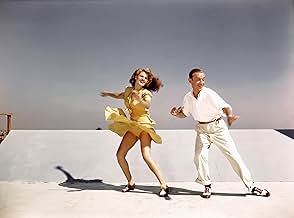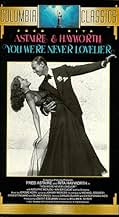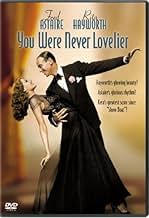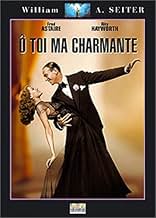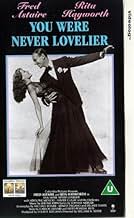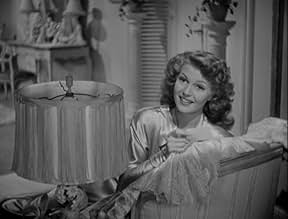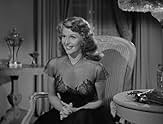VALUTAZIONE IMDb
7,1/10
4353
LA TUA VALUTAZIONE
A Buenos Aires, un uomo che ha decretato che le sue figlie debbano essere sposate in ordine di età permette a un ballerino americano di esibirsi nel suo locale a condizione che si atteggi co... Leggi tuttoA Buenos Aires, un uomo che ha decretato che le sue figlie debbano essere sposate in ordine di età permette a un ballerino americano di esibirsi nel suo locale a condizione che si atteggi come corteggiatore della sua secondogenita.A Buenos Aires, un uomo che ha decretato che le sue figlie debbano essere sposate in ordine di età permette a un ballerino americano di esibirsi nel suo locale a condizione che si atteggi come corteggiatore della sua secondogenita.
- Regia
- Sceneggiatura
- Star
- Candidato a 3 Oscar
- 3 candidature totali
Kirk Alyn
- Julia's Groom
- (non citato nei titoli originali)
Desi Arnaz
- Band Singer
- (non citato nei titoli originali)
Larry Arnold
- Wedding Guest
- (non citato nei titoli originali)
William A. Boardway
- Wedding Guest
- (non citato nei titoli originali)
Stanley Brown
- Roddy - Cecy's Boyfriend
- (non citato nei titoli originali)
George Bunny
- Flower Man
- (non citato nei titoli originali)
James Carlisle
- Wedding Guest
- (non citato nei titoli originali)
Jack Chefe
- Nightclub Patron
- (non citato nei titoli originali)
Recensioni in evidenza
Fred Astaire's films are all pretty much the same: quaint romantic hijinks driving a ridiculous but entertaining screwball plot. By the 1940s, he and Ginger Rogers had parted ways (at least until 'The Barkleys of Broadway (1949)'), and the studios were left to find him a suitable new partner. RKO's first experiment, opposite Joan Fontaine in 'A Damsel in Distress (1937),' had been far less than successful, as much as I love Joan Fontaine. Astaire's best prospects came from a lovely young lady named Rita Hayworth, with whom he starred in 'You'll Never Get Rich (1941)' and 'You Were Never Lovelier (1942).' Ah, Rita Hayworth! (Forgive me while I regain my train of thought). This comedy musical, directed by William A. Seiter, features the same unlikely romantic mix-ups you'd expect to find in a Fred and Ginger movie of the 1930s. In fact, the director had previously made 'Roberta (1935),' and he improves upon that film.
Eduardo Acuña (Adolphe Menjou) is a man very much used to getting his own way. Determined that his second daughter Maria (Hayworth) should fall in love, he begins writing her anonymous love letters, only for her to mistake American dancer Bob Davis (Astaire) for her nameless romantic suitor. Bob reluctantly agrees to carry on the deception, but soon falls for Maria himself. It doesn't take a genius to guess where this is going, but, like Astaire's previous films, it is well worth watching for the marvellous chemistry of the two leads. Put simply, Hayworth is endlessly, stunningly, ravishingly gorgeous. Though Ginger Rogers' exquisite comedic timing is noticeably absent (leaving Fred to take up the comedic slack), every scene with Hayworth is spent in breathtaking company. And she's not just a pretty face: the young actress is a very talented dancer, keeping up with Astaire step-for-step.
Eduardo Acuña (Adolphe Menjou) is a man very much used to getting his own way. Determined that his second daughter Maria (Hayworth) should fall in love, he begins writing her anonymous love letters, only for her to mistake American dancer Bob Davis (Astaire) for her nameless romantic suitor. Bob reluctantly agrees to carry on the deception, but soon falls for Maria himself. It doesn't take a genius to guess where this is going, but, like Astaire's previous films, it is well worth watching for the marvellous chemistry of the two leads. Put simply, Hayworth is endlessly, stunningly, ravishingly gorgeous. Though Ginger Rogers' exquisite comedic timing is noticeably absent (leaving Fred to take up the comedic slack), every scene with Hayworth is spent in breathtaking company. And she's not just a pretty face: the young actress is a very talented dancer, keeping up with Astaire step-for-step.
Pop quiz: Who was Fred Astaire's favorite female dancing partner? If your answer is the obvious one, Ginger Rogers, guess again. Cyd Charisse, Vera-Ellen, Judy Garland, Joan Leslie, Eleanor Powell? Still wrong. Surprisingly, Astaire long maintained that his favorite was none other than Rita Hayworth. Rita, he once said, could be taught a complicated piece of choreography in the morning and have it down pat after lunch! The two made a pair of films together, "You'll Never Get Rich" in 1941 and "You Were Never Lovelier" in '42. A look at Hayworth's work in the latter film will demonstrate what a remarkable learner she apparently was. She and Fred share several musical numbers here, including the moonlit garden waltz to "I'm Old Fashioned" and the remarkably high-spirited and dynamic "Shorty George," and the two do make a marvelous pair. As for the rest of the film, it is a typical Astaire comedy, replete with mistaken identities, concerning Rita's father, Adolphe Menjou, convincing Fred to impersonate the fictitious lover that he has devised for her. The viewer must wait almost 40 full minutes to see Fred dance in this one, but that wait is well repaid when Astaire explodes in a brash and frenetic audition number for ol' Adolphe. The film's script is bright and amusing, Xavier Cugat's orchestra adds colorful support, and Rita is at least as beautiful, if not more so, than in 1946's overrated "Gilda." Bottom line: This is no Fred & Ginger picture, but it sure does have its compensations...Rita Hayworth surely being one of them.
she is - this time in "You Were Never Lovelier," a 1942 film starring Fred Astaire, Adolphe Menjou, and Xavier Cugat along with Hayworth. Menjou plays Eduardo Acuna, the father of four daughters in Argentina, and according to tradition, the girls must marry in order. Second to be married is Maria (Hayworth). Unfortunately, in this case, the two younger daughters have suitors and Maria has no interest in marriage or in any of the dozens of men who have tried to win her heart. Her father hatches a plan to send her orchids and letters from a secret admirer. Then he plans for the secret admirer to disappear, hoping that she'll then turn to an ordinary man. When he has a dancer, Bob Davis (Astaire) who is trying to get a job in the club deliver the orchids, Maria thinks that Davis is her secret admirer. The two wind up falling in love, which doesn't fit in with Dad's plans.
Hayworth's first entrance in this is as she gives her sister something for her wedding. She's so gorgeous it's ridiculous. It's said that during the making of Blood & Sand, Tyrone Power was so enamored of Hayworth that he couldn't stop staring at her (and in fact, she's one of the few women who could match him looks-wise). Not surprising. What's wonderful about this film is that Hayworth wears fabulous gowns and dances with Fred Astaire. They make a terrific pair, and Astaire loved working with her. When they dance to "I'm Old Fashioned," it's as if they're floating on a cloud. She seems to bring out a sweet side to Astaire's acting, and the character he plays is less sure of himself than the Astaire roles usually are. And of course, he dances like a dream, with a wonderful audition solo for Menjou.
For this writer, there were many beautiful women in Hollywood. But two were the complete movie star package with superior beauty, personality, and raw sex appeal - Rita Hayworth and Ava Gardner. Rita, with her wonderful dance talent, probably has a slight edge. It's tragic that her personal life was so sad and that she herself was such a troubled woman. It just doesn't seem fair to be that sensational and that miserable at the same time.
This is a lovely, romantic film produced specifically for the World War II audience - while we're not going through World War II today, most of us are depressed enough that we could be, so it's still a great watch.
Hayworth's first entrance in this is as she gives her sister something for her wedding. She's so gorgeous it's ridiculous. It's said that during the making of Blood & Sand, Tyrone Power was so enamored of Hayworth that he couldn't stop staring at her (and in fact, she's one of the few women who could match him looks-wise). Not surprising. What's wonderful about this film is that Hayworth wears fabulous gowns and dances with Fred Astaire. They make a terrific pair, and Astaire loved working with her. When they dance to "I'm Old Fashioned," it's as if they're floating on a cloud. She seems to bring out a sweet side to Astaire's acting, and the character he plays is less sure of himself than the Astaire roles usually are. And of course, he dances like a dream, with a wonderful audition solo for Menjou.
For this writer, there were many beautiful women in Hollywood. But two were the complete movie star package with superior beauty, personality, and raw sex appeal - Rita Hayworth and Ava Gardner. Rita, with her wonderful dance talent, probably has a slight edge. It's tragic that her personal life was so sad and that she herself was such a troubled woman. It just doesn't seem fair to be that sensational and that miserable at the same time.
This is a lovely, romantic film produced specifically for the World War II audience - while we're not going through World War II today, most of us are depressed enough that we could be, so it's still a great watch.
It would have been nice had this not been World War II and we could actually have done this film in Buenos Aires. As it is, except for a few newsreel shots at the beginning of the film, this might as well have taken place in San Diego.
Having said that this tinsel of a story is put over by the charm and beauty of its two leads, Fred Astaire and Rita Hayworth. Not to mention a good supporting cast led by Adolphe Menjou who is busy poaching on the preserve of Hollywood cranky fathers usually inhabited by folks like Eugene Palette and George Barbier.
Menjou's got some strange ideas. He wants to see his daughters get married, but in descending order. Rita is number two daughter and she's holding things up for three and four. Of course numbers three and four have fiancés panting at the bit.
Through the usual comedy of errors that are prevalent in Fred Astaire movies, Menjou's conceived a dislike for Fred and Rita's seeing something in him. How will it all work out?
Astaire movies always have flimsy or silly plot lines, but they have him and an attractive female partner dancing to some of the best music ever written for the screen. And when it's Jerome Kern's music, it don't get much better than that.
And the dancing partners don't get more talented than Rita Hayworth. She is positively radiant in this film. And she and Fred dance divinely to one of my favorite Jerome Kern ballads, I'm Old Fashioned.
Reason enough to see this film.
Having said that this tinsel of a story is put over by the charm and beauty of its two leads, Fred Astaire and Rita Hayworth. Not to mention a good supporting cast led by Adolphe Menjou who is busy poaching on the preserve of Hollywood cranky fathers usually inhabited by folks like Eugene Palette and George Barbier.
Menjou's got some strange ideas. He wants to see his daughters get married, but in descending order. Rita is number two daughter and she's holding things up for three and four. Of course numbers three and four have fiancés panting at the bit.
Through the usual comedy of errors that are prevalent in Fred Astaire movies, Menjou's conceived a dislike for Fred and Rita's seeing something in him. How will it all work out?
Astaire movies always have flimsy or silly plot lines, but they have him and an attractive female partner dancing to some of the best music ever written for the screen. And when it's Jerome Kern's music, it don't get much better than that.
And the dancing partners don't get more talented than Rita Hayworth. She is positively radiant in this film. And she and Fred dance divinely to one of my favorite Jerome Kern ballads, I'm Old Fashioned.
Reason enough to see this film.
Okay, it's not Tosca. But holy smoke, what an efflorescence of talented song writers and lyricists the American stage produced in the thirty years between 1925 and 1955! Irving Berlin, George and Ira Gershwin, Yip Harburg, Johnny Mercer, Jerome Kern, Cole Porter, the list goes on. And the songs! From Astaire's films alone, we have Orchids in the Moonlight, The Carioca, Let's Face the Music and Dance, Yesterdays, Smoke Gets in Your Eyes, Cheek to Cheek, The Way You Look Tonight, A Fine Romance, They All Laughed, Let's Call the Whole Thing off ("You say tomato, I say tomahto..."), They Can't Take That Away From Me. That's a handful of the more familiar numbers from the first films Astaire made with Ginger Rogers.
"You Were Never Lovelier" has melodies by Jerome Kern and lyrics by Johnny Mercer. Ginger isn't here, but Rita Hayworth is. Her beauty is undeniable. She'd undergone hair removal and Hollywood glamorization by this time and in a few years a pin-up pic of her was to be pasted onto a famous bomb. I missed Astaire's earlier movies. By the time I was old enough, Gene Kelly dominated the screen. I saw Astaire in his later films and didn't like him nearly as much as Kelly. Kelly's background was in athletics. He was masculine and muscular and working class. Astaire's background was in ballroom dancing. How can an adolescent identify with a skinny balding narrow-shouldered dancer in a tuxedo who doesn't swing from ropes? But there's no longer much doubt in most peoples' minds, including mine, that Astaire was by far the better dancer, Kelly's charm notwithstanding. Astaire was elegant and precise and his dance steps were varied; Kelly seemed to repeat his leg-over-leg jumps over and over in each number.
At any rate, the plot of "You Were Never Lovelier" is rather original for an Astaire musical. I don't think it goes farther back in history than Aristophanes. It's a complicated business involving mistaken identities, an interfering father, and whatnot. But it doesn't matter, because the numbers are what counts. Kern and Mercer provide two songs that have become standards: "Dearly Beloved" and "I'm Old Fashioned." Anyone who wants to see the Hollywood musical at its best would be advised to listen to either song and to watch the dancing during "I'm Old Fashioned." "Dearly Beloved" occurs throughout the film as a kind of theme, and is sung once by Astaire and once by Hayworth, but is never accompanied by a dance. There are other songs too, of course, although none enchants the way these two ballads do. One of the numbers is "The Shorty George." Astaire's movies often had references to a new popular dance craze -- The Carioca, The Yam, the Sluefoot -- and this is an instance of that tendency. It was named after a real dancer, George Snowden, a dancer at the Savoy Ballroom in Harlem, known as "Shorty." If "I'm Old Fashioned" has a swooping grace, "The Shorty George" includes sections set at a blistering tempo and demonstrates Rita Hayworth's energy and range as a dancer.
Speaking of energy, how do they do it? "I'm Old Fashioned", like most of Astaire's numbers, consists of very long takes in medium distance that depend on both precision and physical stamina. (If you want to see an example of the opposite, watch Travolta do his final number in "Staying Alive.") I counted three cuts during the entire dance, which lasts four minutes and thirty-seven seconds. I'd have a heart attack after the first thirty-seven seconds.
Well, okay. It's not Fred and Ginger. It's not even Tosca. But if you want to watch two people engaged in the unpretentious exercise of a physical skill acquired only with the utmost difficulty, this one shouldn't be missed.
"You Were Never Lovelier" has melodies by Jerome Kern and lyrics by Johnny Mercer. Ginger isn't here, but Rita Hayworth is. Her beauty is undeniable. She'd undergone hair removal and Hollywood glamorization by this time and in a few years a pin-up pic of her was to be pasted onto a famous bomb. I missed Astaire's earlier movies. By the time I was old enough, Gene Kelly dominated the screen. I saw Astaire in his later films and didn't like him nearly as much as Kelly. Kelly's background was in athletics. He was masculine and muscular and working class. Astaire's background was in ballroom dancing. How can an adolescent identify with a skinny balding narrow-shouldered dancer in a tuxedo who doesn't swing from ropes? But there's no longer much doubt in most peoples' minds, including mine, that Astaire was by far the better dancer, Kelly's charm notwithstanding. Astaire was elegant and precise and his dance steps were varied; Kelly seemed to repeat his leg-over-leg jumps over and over in each number.
At any rate, the plot of "You Were Never Lovelier" is rather original for an Astaire musical. I don't think it goes farther back in history than Aristophanes. It's a complicated business involving mistaken identities, an interfering father, and whatnot. But it doesn't matter, because the numbers are what counts. Kern and Mercer provide two songs that have become standards: "Dearly Beloved" and "I'm Old Fashioned." Anyone who wants to see the Hollywood musical at its best would be advised to listen to either song and to watch the dancing during "I'm Old Fashioned." "Dearly Beloved" occurs throughout the film as a kind of theme, and is sung once by Astaire and once by Hayworth, but is never accompanied by a dance. There are other songs too, of course, although none enchants the way these two ballads do. One of the numbers is "The Shorty George." Astaire's movies often had references to a new popular dance craze -- The Carioca, The Yam, the Sluefoot -- and this is an instance of that tendency. It was named after a real dancer, George Snowden, a dancer at the Savoy Ballroom in Harlem, known as "Shorty." If "I'm Old Fashioned" has a swooping grace, "The Shorty George" includes sections set at a blistering tempo and demonstrates Rita Hayworth's energy and range as a dancer.
Speaking of energy, how do they do it? "I'm Old Fashioned", like most of Astaire's numbers, consists of very long takes in medium distance that depend on both precision and physical stamina. (If you want to see an example of the opposite, watch Travolta do his final number in "Staying Alive.") I counted three cuts during the entire dance, which lasts four minutes and thirty-seven seconds. I'd have a heart attack after the first thirty-seven seconds.
Well, okay. It's not Fred and Ginger. It's not even Tosca. But if you want to watch two people engaged in the unpretentious exercise of a physical skill acquired only with the utmost difficulty, this one shouldn't be missed.
Lo sapevi?
- QuizBecause all the sets on the Columbia lot were occupied, Fred Astaire and Rita Hayworth rehearsed most of their routines in the nearby Hollywood Cemetery funeral parlor. They had to stop rehearsing to the upbeat music whenever a funeral procession arrived.
- BlooperWhen Maria and Mrs. Castro meet Robert in the sky room, Maria holds her overcoat lapels with both hands. Between shots she appears with both her arms hanging.
- Citazioni
Mrs. Delfina Acuña: I wish you wouldn't speak while I'm interrupting.
- Curiosità sui creditiIn the opening credits, the two film stars and the movie title appear on the front and back of a flower gift card held in the hands of a glamorous woman. The rest of the credits follow as in normal film credits.
- ConnessioniFeatured in Il sogno del mare - Rocket Gibraltar (1988)
- Colonne sonoreYou Were Never Lovelier
(1942) (uncredited)
Music by Jerome Kern
Lyrics by Johnny Mercer
Played during the opening credits and often as background music
Played by Xavier Cugat and His Orchestra and sung by Fred Astaire
Danced by Fred Astaire and Rita Hayworth at the anniversary party
Danced by Fred Astaire and Rita Hayworth at the end and sung by an offscreen chorus
I più visti
Accedi per valutare e creare un elenco di titoli salvati per ottenere consigli personalizzati
- How long is You Were Never Lovelier?Powered by Alexa
Dettagli
- Data di uscita
- Paese di origine
- Lingua
- Celebre anche come
- You Were Never Lovelier
- Azienda produttrice
- Vedi altri crediti dell’azienda su IMDbPro
Botteghino
- Lordo Stati Uniti e Canada
- 672.900 USD
- Tempo di esecuzione1 ora 37 minuti
- Colore
- Proporzioni
- 1.37 : 1
Contribuisci a questa pagina
Suggerisci una modifica o aggiungi i contenuti mancanti

Divario superiore
By what name was Non sei mai stata così bella (1942) officially released in India in English?
Rispondi

